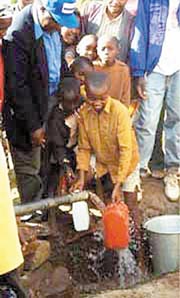
To accomplish its goal, LWI purchased a used Jaswell 3500 drill rig with a 900/350 air compressor on-board and sent it to Kenya to begin training staff to operate it. The group also received significant contributions from Numa, a leading designer and manufacturer of down-hole hammers and bits, in the form of Champion 80E down-hole hammers and 8 1?inch bits. Much of the drilling on these projects was conducted by newly trained rig operators in extremely remote locations where replacement parts are hard to come by. The equipment being used had to continue to operate without incidence of failure in order for the projects to be completed in an acceptable amount of time.
Over the past 11 years, LWI has helped to improve the quality of life in many areas of the globe. In addition to Kenya, LWI now has operations in El Salvador, Ghana, Guatemala, Honduras, India, Panama and Peru. LWI also sponsors or participates in water projects in Angola, Haiti, Mexico, Mindanao, Myanmar, Nicaragua, Romania, Sudan, Tanzania and Uganda. Three recently completed projects typify what Living Water's compassionate service is all about.
In Kenya, the Moe Girls School, located 10 miles northwest of Nairobi, relied upon a nearby river for all its water needs. This water was disease-ridden and caused many health problems. Since the school is in a very poor area, it could not afford a better water supply. Living Water heard of the school's predicament and came to its aid. In a short amount of time, LWI crews were able to drill two water wells that were 940 feet deep to provide the school with its very own clean and safe water supply. The introduction of clean water has resulted in much improved health of all school children and has increased school attendance.

A third success story comes from a government hospital 100 miles outside of Nairobi. For five years, the hospital had no designated water supply. Patients had to bring in their own water for surgery, cooking, bathing and cleaning of wounds. As you can imagine, the water that was usually brought in came from many different sources and was never very clean. Risk of infection and waterborne illness was rampant. LWI was able to help as it arranged for the drilling of a 600-foot water well. The hospital now has its own dedicated, clean water supply that can be used for all its patients. The water supply is so abundant that the hospital sells some of it to others in the area in order to help the hospital buy supplies, which helps to better serve the community.
These are just a small sampling of the overwhelming number of projects that Living Water has completed. All across the world, communities in need of clean water have felt LWI's compassion. If you would like to help Living Water provide clean water in developing nations around the world, contact Gary Evans, president of Living Water in Sugar Land, Texas, at 281-261-7984, or visit the organization's Web site at www.living-water.org. All monetary and in-kind contributions to LWI are tax-deductible as allowed by law.

Sidebar: How You Can Help
Living Water International (LWI) always is in need of volunteers to help with its drilling efforts. Throughout the year in Cleveland, Texas, LWI offers training in several fields to prepare volunteers for the missions. Training in other locations also occurs periodically throughout the year. For more information or to register, call Rita Hough, camp coordinator, at 281-261-7984. To sign up online, visit www.living-water.org. Training dates for the Texas facility are listed below.
Feb. 20-24 - Shallow Well Drill Training
Mar. 20-24 - Team Leader Training
April 24-28 - Drill Training
May 15-19 - Youth Drill Training
June 19-23 - Drill Camp
July 17-20 - Health & Hygiene/Slow Sand Filter
Aug. 20-25 - Pump Repair
Sept. 25-29 - Advanced Drill/Drill Training
Nov. 20-24 - Drill Training
Report Abusive Comment